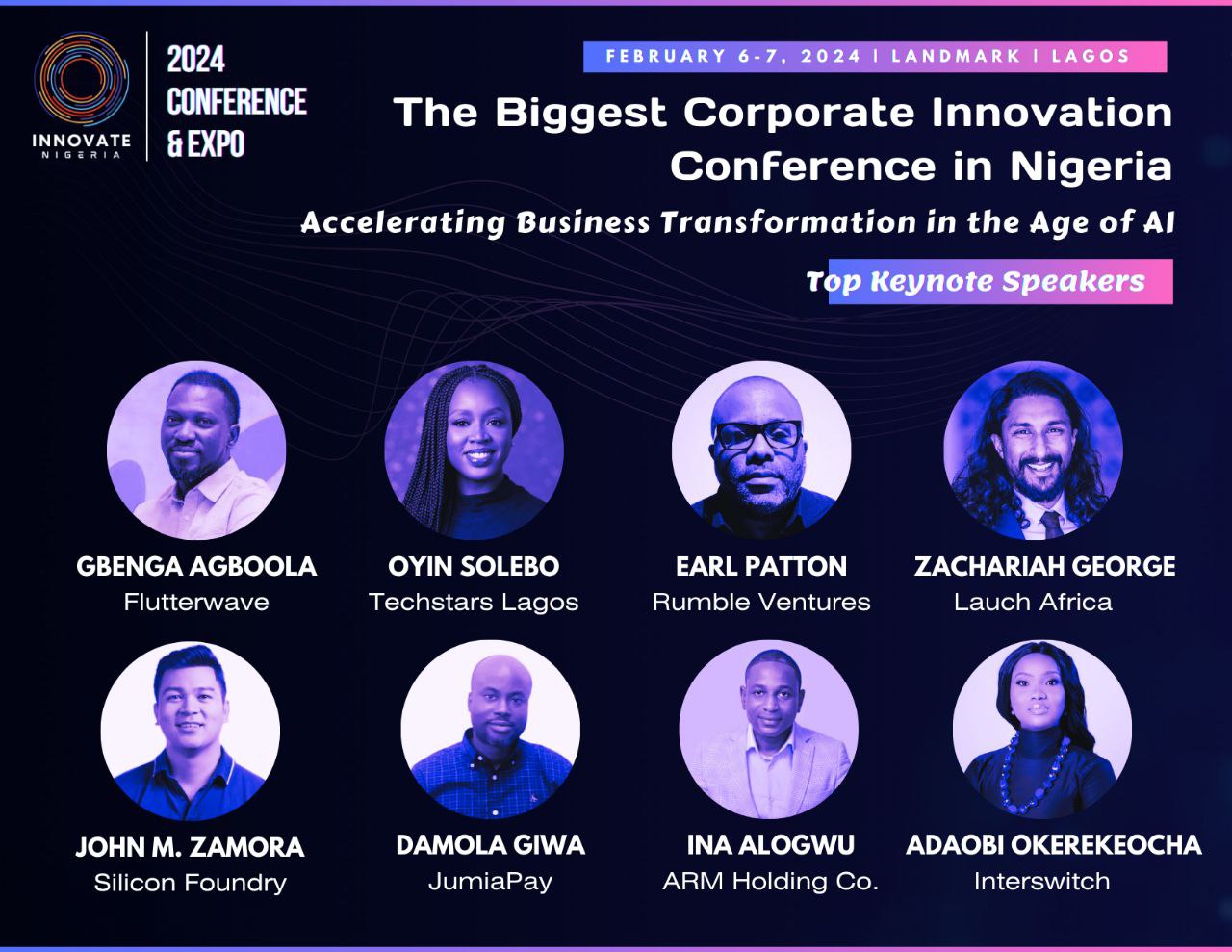The top corporate innovation gathering, Innovate Nigeria, is going to hold a conference that will take place over the course of two days on February 6-7, 2024. This conference will have a significant impact on the business landscape in Nigeria and Africa.
The intention of the event, which will take place at the Landmark Events Center in Victoria Island, Lagos, is to encourage collaboration and speed up the process of company transformation in the age of artificial intelligence.
The Innovate Nigeria Conference is a nexus where start-up founders, corporate leaders, investors, technology executives, and public sector leaders will come together to advocate, support, and co-create revolutionary ideas with the potential to reshape businesses not only in Nigeria but also across the African continent and the world, according to a statement released by the organisers of the conference.
Read also: NITDA’s 2023 Digital Conference begins with emerging technology
Innovate Nigeria Conference Updates
At the conference, significant participants in the business and technology environment, together with regulators, will be brought together.
“It aims to initiate crucial conversations and develop partnerships and frameworks that will sustain Start-Ups and foster innovation, expansion, and thriving for large businesses. The overarching objective is to position Nigeria as a global business leader and bring Africa along on the journey,” the statement said.
Among the key industry players that Innovate Nigeria has secured strategic partnerships with are Novatech, a company that specializes in cutting-edge technology solutions; ARM Labs Lagos Techstars Accelerator; Jumia Pay; Trade Lenda; Build Ventures Africa; the United States Consulate General in Lagos; Afriglocal Venture Capital; Vencapital; Phenom Communications; DG Communications; Kurious K Media; and many more that will be announced in the coming weeks.
Furthermore, the event will take place over the course of two days and will include exhibitions and trade events that will facilitate connections between investors and entrepreneurs.
Additionally, collaboration, collaborations, and even mergers and acquisitions will be driven via industry-specific meetings and fireside chats with the company’s founders and other business leaders. We will investigate the role that policy plays in influencing the economic and technical landscape through the use of panels and conversations with representatives from Government officials.
How different sectors can benefit from AI
Automation of customer service in the services industry involves the use of artificial intelligence chatbots and virtual assistants to handle customer inquiries, complaints, and frequently asked questions (FAQs), with the goal of reducing response times and increasing customer satisfaction.
Implementing artificial intelligence algorithms to determine when a piece of machinery or system is likely to break is an example of predictive maintenance. This facilitates preventative maintenance in industries such as heating, ventilation, and air conditioning (HVAC), elevators, and automotive services, hence lowering both downtime and expenses.
Implementing artificial intelligence to analyze transaction data in real-time in order to identify and prevent fraudulent activity, hence increasing the level of security for both the company and its customers for the purpose of fraud detection and prevention.
The education sector is home to adaptive learning platforms, which are platforms powered by artificial intelligence that can adjust to the learning styles and paces of individual students. These platforms offer personalized educational experiences and work to improve learning results.
Automation of grading and feedback refers to the use of artificial intelligence to grade assignments and provide feedback, thereby saving teachers time and ensuring that students receive timely responses.
Through the utilization of real-time video and audio analysis monitoring, artificial intelligence has the potential to drastically limit instances of exam misconduct. These proctoring systems, which are powered by artificial intelligence, use facial recognition to verify identities and assess reaction patterns in order to identify instances of cheating. The integrity of examinations is protected by this technology, particularly in large-scale or remote examinations, which helps to maintain academic fairness in an effective manner.
Personalized service recommendations are the result of using artificial intelligence to analyze consumer data and behavior in order to provide personalized services. For example, in the hospitality business, personalized vacation recommendations are provided, and in the fitness industry, customized workout regimens are provided.
E-commerce industry: Personalized Shopping Experiences: Artificial intelligence algorithms monitor consumer behavior, previous purchases, and preferences in order to make product recommendations. This helps to improve customer engagement and ultimately leads to an increase in sales.
Management of inventory and demand forecasting: Artificial intelligence tools can forecast future product demand, which allows for the optimization of inventory levels and the reduction of overstock or stockouts, resulting in cost savings and an improvement in efficiency.
